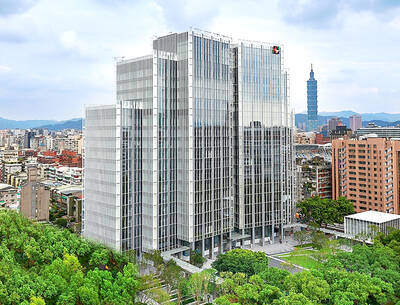The Directorate-General of Budget, Accounting and Statistics (DGBAS) yesterday increased its projection for GDP growth this year from 4.32 percent to 4.78 percent in response to planned government spending.
“In spite of the global economic slowdown, the new government will make efforts to boost the local economy,” DGBAS Director-General Shih Su-mei (石素梅) told a media briefing.
GNP this year is expected to total NT$13.48 trillion (US$442.6 billion), or US$19,143 per capita, Shih said.
The upward revision of 0.46 percentage points reflects expected contributions from NT$116 billion in government spending in the second half of the year and from Chinese tourists after July, DGBAS Director Tsai Hung-kun (蔡鴻坤) said.
Spending by the central government is expected to grow 10 percent year-on-year to the highest since 1995, Tsai said, adding that the agency had previously predicted a 2 percent contraction.
“It’s very clear that the government intends to boost the economy by spending on a massive scale,” Tony Phoo (符銘財), chief economist of Standard Chartered Bank, said by telephone yesterday.
If 3,000 Chinese tourists entered the country every day starting in July, they could spend a total of NT$25.7 billion if each stayed for a week, the DGBAS said, adding that this would boost this year’s GDP by between 0.15 percent and 0.2 percent, Tsai said.
However, as Beijing has proposed allowing 18 cross-strait flights, or around 1,000 tourists per week, the government does not expect 3,000 tourists per day starting in July.
Tsai said the projected growth in GDP also reflected better-than-expected exports.
The bureau has also revised its forecast for annual export growth to 12.3 percent this year, up from the 6.1 percent estimated in late February.
Tsai said that the nation’s export performance in the first quarter was better than expected and saw little negative impact from the US economic slowdown.
“Signs indicate that the Asian economy may have distanced itself from the US economy, since our exports to emerging Asian countries outperformed those to our US and European export partners,” Tsai said.
Exports to five ASEAN countries, including Vietnam, as well as to India, represented 18.7 percent of total exports in the first quarter, while the US and the EU represented 11.4 percent and 10.9 percent respectively, the DGBAS said.
GDP growth in the first quarter was 6.06 percent, with the consumer price index (CPI) hitting 3.58 percent over the same period, the DGBAS said.
Inflation is expected to continue rising this year, averaging 3.29 percent — the highest inflation since 1996 — as a result of soaring oil and food prices, Tsai said.
Cheng Chen-mount (鄭貞茂), chief economist at Citibank NA (花旗銀行), said yesterday that the government’s upward revision to its GDP forecast was “reasonable” considering the expectations from government spending increased business ties with China.
“Infrastructure spending will be positive for the nation’s economic growth,” Cheng said by phone.
After GDP growth in the first quarter beat the bank’s estimate of 5.2 percent, Cheng said Citibank would raise its GDP forecast for the year from 4.2 percent to 4.4 percent.

UNCERTAINTY: Investors remain worried that trade negotiations with Washington could go poorly, given Trump’s inconsistency on tariffs in his second term, experts said The consumer confidence index this month fell for a ninth consecutive month to its lowest level in 13 months, as global trade uncertainties and tariff risks cloud Taiwan’s economic outlook, a survey released yesterday by National Central University found. The biggest decline came from the timing for stock investments, which plunged 11.82 points to 26.82, underscoring bleak investor confidence, it said. “Although the TAIEX reclaimed the 21,000-point mark after the US and China agreed to bury the hatchet for 90 days, investors remain worried that the situation would turn sour later,” said Dachrahn Wu (吳大任), director of the university’s Research Center for

Alchip Technologies Ltd (世芯), an application-specific integrated circuit (ASIC) designer specializing in artificial-intelligence (AI) chips, yesterday said that small-volume production of 3-nanometer (nm) chips for a key customer is on track to start by the end of this year, dismissing speculation about delays in producing advanced chips. As Alchip is transitioning from 7-nanometer and 5-nanometer process technology to 3 nanometers, investors and shareholders have been closely monitoring whether the company is navigating through such transition smoothly. “We are proceeding well in [building] this generation [of chips]. It appears to me that no revision will be required. We have achieved success in designing

PROJECTION: KGI Financial said that based on its foreign exchange exposure, a NT$0.1 increase in the New Taiwan dollar would negatively impact it by about NT$1.7 billion KGI Financial Holding Co (凱基金控) yesterday said its life insurance arm has increased hedging and adopted other moves to curb the impact of the local currency’s appreciation on its profitability. “It is difficult to accurately depict the hedging costs, which might vary from 7 percent to 40 percent in a single day,” KGI Life Insurance Co (凱基人壽) told an investors’ conference in Taipei. KGI Life, which underpinned 66 percent of the group’s total net income last year, has elevated hedging to 55 to 60 percent, while using a basket of currencies to manage currency volatility, the insurer said. As different

Taiwanese insurers are facing difficult questions about the damage of recent swings in the New Taiwan dollar. Regulators might have a partial solution: letting firms change how they calculate the value of foreign currency assets. The Financial Supervisory Commission (FSC) is considering allowing insurers to use six-month average exchange rates when they calculate risk-based capital in their semiannual reports, a shift from the current system where insurers use exchange rates on the final day of reporting. The change could ease pressure on the US$1.2 trillion insurance sector, whose huge exposure to foreign assets came into the spotlight earlier this month after a